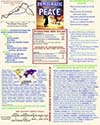[February 4, 2005] I want to comment on the UN report denying genocide in Darfur. But, first I want to clarify the difference between genocide and democide. Often in this blog I use the latter term democide for murder by government, as do some of my links. But the more popular term is genocide, as in the aforementioned UN report.
What are the differences and similarities between democide and genocide? As defined, elaborated, and qualified in my Death By Government). Democide is any murder by officials acting under the authority of the central government. That is, they act according to explicit or implicit government policy or with the implicit or explicit approval of the highest officials. Such was the burying alive of Chinese civilians by Japanese soldiers, the shooting of hostages by German soldiers, or the starving to death of Ukrainians by communist cadre.
Genocide, however, is a confused and confusing concept. It may or may not include government murder, refer to wholly or partially eliminating some group, or involve psychological damage. If it includes government murder, it may mean all such murder or just some. Boiling all this down, genocide can have three different meanings (on this, see my encyclopedia entry here).
One meaning is that defined by international treaty, the Convention on the Prevention and Punishment of the Crime of Genocide. This makes genocide a punishable crime under international law, and defines it as:
any of the following acts committed with intent to destroy, in whole or in part, a national, ethnical, racial, or religious group, as such:(a) Killing members of the group;
(b) Causing serious bodily or mental harm to members of the group;
(c) Deliberately inflicting on the group conditions of life calculated to bring about its physical destruction in whole or in part;
(d) Imposing measures intended to prevent births within the group;
(e) Forcibly transferring children of the group to another group.
Note that only the first clause includes outright killing, while the other clauses cover non-killing ways of eliminating a group. I will call this definition the legal meaning of genocide, since it is now part of international law.
Regardless of this definition and doubtlessly influenced by the Holocaust, ordinary usage and that by students of genocide have tended to wholly equate it with the murder and only the murder by government of people because of their nationality, race, ethnicity, or religion. This equating of genocide with the killing of people because of their indelible group membership I will label the common meaning of genocide.
What about government murdering people for other reasons than their indelible group membership? What about government organized death squads eliminating communist sympathizers, simply fulfilling a government death quota (as in the Soviet Union under Stalin), or the murder of those who criticized government policy? None of such murders are genocide according the legal and common meanings. To cover such murders, some students of genocide have stretched its meaning to include all government murder, regardless of group identity. This may be aptly named the generalized meaning of genocide. In this meaning, genocide = democide.
As obvious, the problem with the generalized meaning of genocide is that to fill one void it creates another. For if genocide refers to all government murder, what are we to call the murder of people because of their nationality, race, ethnicity, or religion? It is precisely because of this conceptual problem that the concept of democide is useful.
For understanding and research, the legal view of genocide is too complex and subsumes behavior too different in kind. I argue, therefore, that genocide should ordinarily be understood as the government murder of people because of their indelible group membership (let the international lawyers struggle with the legal meaning), and democide as any murder by government, including this form of genocide.
This understood, governments murdered about 170,000,000 people in the last century, 1900-1987. Around 38,000,000 of that was genocide. For what governments committed what and when, see Tables 16A.1 of my Statistics of Democide (link here).
Link of Note
”20th Century Democide” By R.J. Rummel
A narrative and statistical overview.
Power kills, absolute Power kills absolutely . . . . The more power a government has, the more it can act arbitrarily according to the whims and desires of the elite, the more it will make war on others and murder its foreign and domestic subjects. The more constrained the power of governments, the more it is diffused, checked and balanced, the less it will aggress on others and commit democide. At the extremes of Power, totalitarian communist governments slaughter their people by the tens of millions, while many democracies can barely bring themselves to execute even serial murderers.



 Posted by rudyrummel
Posted by rudyrummel 






